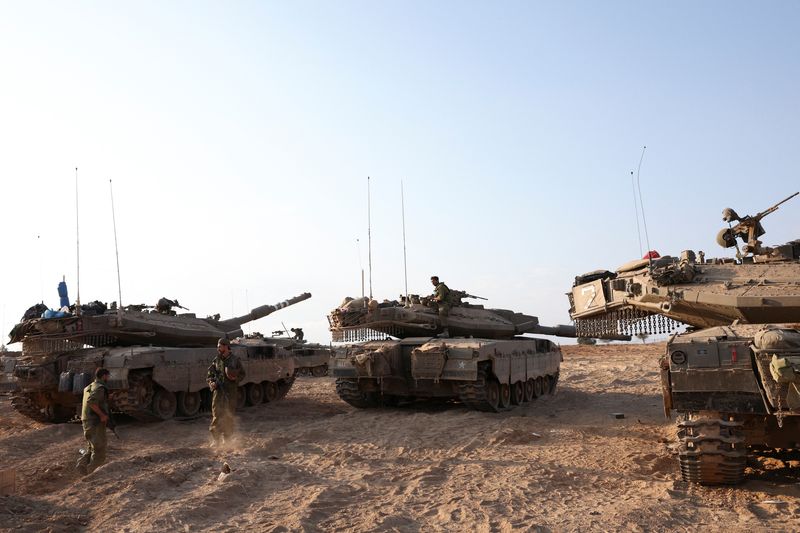By Matt Tracy and Saqib Iqbal Ahmed
WASHINGTON (Reuters) -The Israeli-Hamas war has sharpened focus on rising geopolitical risks for financial markets, as investors wait to see if the conflict draws in other countries with the potential to drive up oil prices further and deal a fresh blow to the world economy.
Israel's Prime Minister Benjamin Netanyahu vowed on Sunday to "demolish Hamas" as his military prepared ground operations in Gaza to root out the militant group, whose deadly rampage through Israeli border towns stunned the nation.
S&P 500 E-Mini futures edged up after they opened on Sunday, last up 0.2%, while oil prices were virtually unchanged.
Trading had been choppy in the last week as Wall Street worried about whether other countries such as Iran would get involved, but investors were directing most of their attention to interest rates and issues related to the U.S. economy.
"As long as the war remains relatively localized, U.S. investors are keeping an eye on the Middle East but focused on the Federal Reserve and the earnings season," said Paul Nolte, market strategist for Murphy & Sylvest in Elmhurst, Illinois.
Oil futures had leapt nearly 6% on Friday, as investors priced in the possibility of a wider Middle East conflict. The first indicator of reaction to weekend developments will likely come when oil starts trading in Asia later on Sunday. [O/R]
"It looks like we're headed for a massive ground invasion of Gaza and a large-scale loss of life," said Ben Cahill, senior fellow in the Energy Security and Climate Change Program at the Center for Strategic and International Studies (CSIS). "Anytime you have a conflict of this scale, you will have a market reaction."
Market reaction in the past week has been relatively muted, though Israel's shekel currency took a big hit.
"I have no clue whether markets will remain relatively well behaved," said Erik Nielsen, group chief economics adviser at UniCredit. "It almost certainly depends on whether this latest conflict remains localized or whether it escalates into a broader Middle Eastern war."
The S&P 500 fell 0.5% on Friday. Safe-haven assets saw buying with gold up more than 3% on Friday and the U.S. dollar touching a one-week high.
An expanding conflict would also likely cause inflation and, as a byproduct, interest rates around the world to accelerate further, said Bernard Baumohl, chief global economist at The Economic Outlook Group in Princeton, New Jersey.
However, while inflation and rates in other countries will likely rise in this worst-case scenario, the United States could be the exception as foreign investors pour capital into what they deem a safe haven during global conflict, Baumohl noted.
"Interest rates could go down," he said. "Expect the dollar to strengthen."
In Europe, economists said the bar for another rate hike from the European Central Bank was high.
The war between the Islamist group Hamas and Israel poses one of the most significant geopolitical risks to oil markets since Russia's invasion of Ukraine last year.
"If the Ukraine war taught us anything, it's not to underestimate the effect of geopolitics," Nomura European economist George Moran said on the bank's week ahead podcast.
Other energy markets could be impacted, as seen in recent developments such as Chevron (NYSE:CVX) halting natural gas exports through a major subsea pipeline between Israel and Egypt.
Rising oil prices are unlikely to have a significant impact on U.S. gas prices or consumer spending, analysts noted.
The situation, however, bears monitoring, said Jack Ablin, chief investment officer at Cresset Capital.
"If all of a sudden either oil production is cut or oil transport is disrupted then that certainly creates problems not just for economies but for markets too," he said.
Oil, shares of oil companies and commodities in general and gold in particular could serve as effective hedges for investors, Ablin said.
